Towards Sustainable Schools
CEE Andhra Pradesh has implemented the project – Student Amateur School Yard Agriculture (SASYA) in 2007 -08 in 150 schools in Medak district with support from UNICEF. The objective was to provide organically grown vegetables for midday meals and to involve students, giving them an opportunity to learn by doing. During 2006-07 another project – Sanitation Awareness,
Assessment and Action for Schools campaign (SAAAF) was implemented to identify the water and sanitation related issues in schools and to solve the same involving various stakeholders.
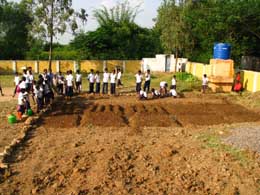 |
Vegetable gardens are being initiated in the schools with support from the community, partner NGOs and students |
|
|
Encouraged by the outcomes of the programmes, this year CEE has taken an initiative to scale up and sustain these two programmes in 300 schools through the programme Towards Sustainable Schools: Students Amateurs in School Yard Agriculture (SASYA) and Sanitation Awareness Assessment and Action for School Campaign (SAAAF) with the support of UNICEF and Department of Education.
The District level training programme was organized where in the Master Teachers, Mandal Education Officers, Mandal Resource Persons and partner NGOs were trained. A manual with guidelines for the programme, and activities for students based on the gardens, has been prepared and distributed. The starter kit for the garden with seeds, samples of bio fertilizers, and bio pesticides were also distributed.
|
|
 |
Pattern Laboratory: Pedagogy for Sustainable Development
Kiran Chhokar and Rajeswari N. Gorana from CEE participated in an international workshop of leading-edge practitioners and researchers working in ESD, held in Visby , Sweden on 4 - 5 November. The workshop was based on a ‘Pattern Laboratory' approach.
Patterns are a fundamental property of complex systems. The discipline of generative pattern languages aims at pattern analysis and in business it has shown that most highly productive organizations exhibit the same patterns of organisation, process and introspection. This approach captures the patterns underlying success, and uses them to establish structures and practices.
The workshop aimed at a systematic approach to make learnings accessible to others by focusing on patterns of behaviour, and in particular on mental patterns that shape behaviour. During the two days, working groups studied and identified pedagogical patterns in the light of ESD work experiences. The participants looked at both functional and dysfunctional patterns in ESD work.
 |
Word Cloud generated using the discussions of one of the groups in the workshop |
|
|
53 participants from 30 countries (Africa, Asia, Latin & Central America, North America, Western Europe & the European Union, East Europe) enriched the exchange and reflection.
The workshop was organized by Swedish International Centre of Education for Sustainable Development ( SWEDESD ) and Global Action Plan ( GAP ) International, an NGO network. SWEDESD collaborates with ESD practitioners and researchers to examine the elements of an effective SD pedagogy critically explore its boundaries and experiment with new approaches and methods. GAP has worked with sustainable behaviour change since 1990. To accelerate learning, GAP has been developing the concept and practice of “Pattern Laboratory”.
|
|
 |
Prakriti Mela
As part of National Green Corps (NGC) programme, CEE Jaipur with Rajasthan Bharat Scouts and Guides conducted a one-day district level Prakriti Mela at Jaipur on 7 November. The main objective was sharing of the NGC activities and thus enhance NGC programme.
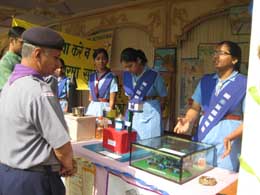 |
Different schools from Jaipur set up stalls that showcased environment related projects, models, demonstration, posters and activities |
|
|
Quiz, poster making, essay and speech competitions were organized. An orientation programme for teacher and students was also facilitated by CEE. Prizes were distributed to all the winners and runners-up of all the competition.
|
|
 |
Sharing Perspectives from the North East
CEE North East team comprising Coordinator Simanta Kalita and Manoranjan Sarmah attended the 3 rd Annual Forum of the Solution Exchange Water community organized by UNICEF in. Simanta, CEE was invited by UNICEF to chair the session on Perspective from North Eastern States: Water. The forum brought together about 300 practitioners from across the country.
Discussion sessions focused on water and sanitation perspectives from east, north east and rest of Indian states. Irrigation, water policies, watershed development and impacts on animals, impacts of large dams, climate change and water resources, sanitation in hilly areas, sanitation in Indian perspective etc. were some of the major issues highlighted in the forum.
A day-long field trip was organized to various community based water monitoring stations, school sanitation programmes and Nirmal Grams (Clean Villages) in West Bengal . Mr. Manoranjan Sarmah participated as a Resource Person in the Knowledge Mela organized as part of the forum. He talked about the CEE's educational packages for water and sanitation education.
|
|
 |
A New Partnership
Perth College, a full academic partner of the UHI millenium Institute, and CEE have signed an MoU to explore opportunity for research, collaboration and mutual support of curriculum for the M.Sc. Interpretation: Management and Practice Programme.
|
|
|
 |
ACCU Photo Message Exhibition reaches Jaipur
The second stop for the ACCU Photo Caravan was Jaipur. The exhibition was displayed at the Jawahar Kala Kendra from 3-5 November 2009.
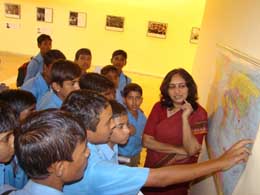 |
Find Vanuatu ! |
|
|
Along with viewing the photographs, over 1500 visitors of all ages participated in a variety of hands-on experiences. Each day of the exhibition hosted one master craftsman who demonstrated the traditional skill and shared the history and processes. The visitors tried their hand at making kites and block printing on cloth. Other popular attractions included a photography workshop and demonstration of creation of Jaipur's famous blue pottery. The media keenly followed and reported on each day's activities.
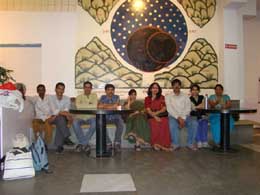 |
Team Jaipur |
|
|
More photos on www.desd.org |
|
 |
Learning to Document SOPs
CEE has gained rich experience of documenting Standard Operating Procedures (SOPs) for Human and Institutional Development. To share these learnings with other organizations, CEE Ahmedabad organized a Training Workshop on SOPs on 13-14 November 2009.
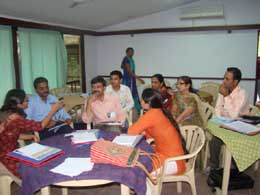 |
SOP is a step by step instruction for the operationalization of procedures for conducting a specific activity in an organization
|
|
|
The objective of the workshop was to learn how SOPs help in defining procedures, codifying learnings, setting systems, assuring quality, and clarifying roles. The 2-day Workshop focused on what, why and how of SOPs with detailed sessions on 'Writing SOPs'.
The workshop was designed for in-service professionals, heads of institutions, top & senior management professionals, trainers from corporates, government & civil society sectors. 14 participants from Corporates and Non-Governmental Organizations (NGOs) attended the workshop. |
|
 |
Celebrating Children's Day with Nature
More than 60 children had a unique opportunity to be close to nature and learn more about the different flora and fauna in the 14 acre lush green CEE Ahmedabad campus. Poiesis Achievement Foundation, a social organization focusing on development of children through their various programs, celebrated children's day by bringing their children on a nature trail. Children spotted a great variety of different birds. They enjoyed watching African mouthbreeder fish and were surprised to know that it breeds eggs in the mouth. Children also understood the concept of food chain and interdependence with the help of 'Web of Life' activity.
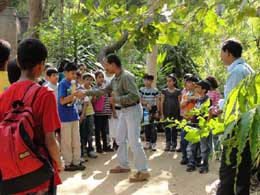 |
'The nature trail has sensitized children and makes them understand how and why the nature should be preserved; which is why we brought them to CEE' Beena Handa, Director, Poesis Achivement Foundation. |
|
|
The two-and-half hour session was facilitated by Mr. Girish Jathar, Programme Officer, Mr. Mayur Mistry, Environment Educationist, Ms. Priya Nair, In-Charge IFC.
CEE's Information and Facilitation Centre (IFC) serves as an interface with visitors and people of Ahmedabad and offers a number of activities like nature trails, bird watching, camps, summer programme for children etc. |
|
|
Fun at the Traffic Park
As a part of the Sustainable School Programme ( SSP ), Euro Kids,Vastrapur visited the Children's Traffic Park near Lal Darwaza.
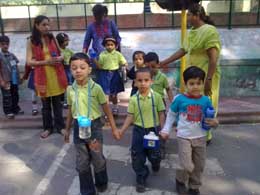 |
Learning by doing about traffic rules, signs and signals |
|
|
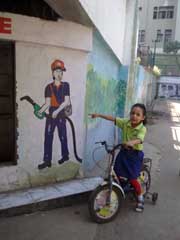 |
A bicycle ride without worrying about traffic |
|
|
The children were shown models of a bus stop, an ambulance, a traffic police man and a fire van. Bridges, railway crossing and a flyover were also shown and they were taught how to use them in the correct way.
|
|
|

|

